|
|
|
Sort Order |
|
|
|
Items / Page
|
|
|
|
|
|
|
| Srl | Item |
| 1 |
ID:
134787
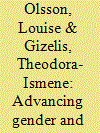

|
|
|
|
|
| Summary/Abstract |
Research on gender and peacekeeping has been revolving around two strands of questions. First, what form of peace does peacekeeping contribute to establishing? And second what are the gender dimensions of how peacekeeping is implemented? Subthemes underlying these questions are concerned with whether women's participation and gender aspects of security should be integral parts of the post-war society and the effectiveness of current gender mainstreaming and balancing policies. In this commentary we argue that there has been considerable progress in the field of gender and peacekeeping. Feminist research has raised questions about the understanding and conceptualisation of peace and security, while empirical research systematically explores the gender dimensions of peacekeeping. Yet, in order for research on gender and peacekeeping to progress, it needs to address issues such as theory underdevelopment, lack of data and continued exclusion from mainstream research. The commentary highlights as an area of particular concern the failure of existing research to find common ground and outlines opportunities of building bridges between empirical and feminist researchers.
|
|
|
|
|
|
|
|
|
|
|
|
|
|
|
|
| 2 |
ID:
167376
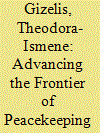

|
|
|
|
|
| Summary/Abstract |
The impact of United Nations (UN) peacekeeping on conflict has received a sustained amount of attention in the empirical literature. The advent of new data on UN peacekeeping and new temporal units of analysis have enabled researchers to expand the frontiers of peacekeeping research and undertake a more nuanced examination of peacekeeping effectiveness. In this special section, a series of articles examine how UN peacekeeping affects different types of violence within conflicts and leads to different types of peaceful outcomes. Factors such as the cultural affinity between peacekeepers and local communities, the size of peacekeeping operations and the specific composition of UN forces are shown to be important variables associated with lower levels of casualties and violence and also a higher likelihood of mediation and timely peaceful settlements in civil wars. In the aggregate, these articles suggest that robust peacekeeping is associated with better outcomes in many stages of conflict.
|
|
|
|
|
|
|
|
|
|
|
|
|
|
|
|
| 3 |
ID:
145594
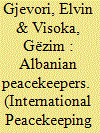

|
|
|
|
|
| Summary/Abstract |
This article provides the first comprehensive account of Albania’s contribution to international peacekeeping and explores its inward-looking rationales for providing peacekeepers. Specifically, we examine why Albania has energetically supported NATO- and EU-led military and crisis management operations and less so UN peacekeeping missions. We find that Albania’s contribution to peacekeeping operations has been primarily shaped by its inward-looking interests for accelerating membership in NATO, fostering integration in the EU, as well as reducing domestic and regional insecurities. Pinpointing accurately the motivations among troop-contributing states helps recover the true hierarchical order of rationales and explain why, in some cases, the performance and impact of peacekeeping operations for some contributing states is secondary. Overall, disentangling the inward-looking utility of peacekeeping by a small state such as Albania provides useful insights for understanding how regional integration dynamics affect peacekeeping.
|
|
|
|
|
|
|
|
|
|
|
|
|
|
|
|
| 4 |
ID:
125004
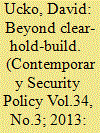

|
|
|
|
|
| Publication |
2013.
|
| Summary/Abstract |
Despite a highly uneven track record, clear-hold-build has remained a dominant, even universal, approach to counterinsurgency. Its prevalence is rooted in its incontestable sequencing of operations and the attendant promise of a linear path towards peace. Yet the appeal of this approach also makes it deceptive and possibly dangerous. Clear-hold-build is not a strategy and must not be mistaken for one, as it has been in Afghanistan, where it inspired false hope for swift progress. Instead, it is necessary to reach a more problematized view of this approach and of what it aims to achieve. This article provides such an evaluation, proposing five principles that should guide its future application. These principles point to the need for a far deeper understanding of how security, development, and governance interact at the local level. Counterinsurgents must understand the relationships between aid and security, between government and governance, and between state and periphery. Where the central government is predatory or lacks support, clear-hold-build also raises difficult questions of authority, legitimacy, and control - questions that counterinsurgents must be capable of answering. Thus problematized, clear-hold-build emerges as a framework with heuristic utility; a schema that can be helpful in planning but which must at the time of application be populated by knowledge, substance, and skill. The implications of these requirements are troubling, particularly for those governments still in the business of armed intervention.
|
|
|
|
|
|
|
|
|
|
|
|
|
|
|
|
| 5 |
ID:
018388


|
|
|
|
|
| Publication |
2000.
|
| Description |
27-44
|
|
|
|
|
|
|
|
|
|
|
|
|
|
|
|
| 6 |
ID:
127070
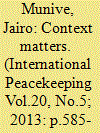

|
|
|
|
|
| Publication |
2013.
|
| Summary/Abstract |
The disarmament, demobilization and reintegration (DDR) programme as implemented in South Sudan provides a perfect entry point to study the interaction between an international intervention and local contexts. The article describes and analyses the DDR programme in South Sudan as a set of practices that are at the core of international peacekeeping and yet are highly challenged by the specificities of local contexts. Consequently, programme results are far from what the international organizations involved expected from the outset, and the case is a vivid example of a lack of context-based approaches to peacebuilding. The article is based on fieldwork conducted among practitioners, project implementers and ex-combatants in South Sudan in 2012.
|
|
|
|
|
|
|
|
|
|
|
|
|
|
|
|
| 7 |
ID:
061871
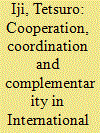

|
|
|
| 8 |
ID:
167377
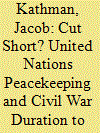

|
|
|
|
|
| Summary/Abstract |
While much literature on peacekeeping seeks to determine the effect of United Nations (UN) intervention on post-conflict peace processes, most peacekeeping operations (PKOs) are deployed to active conflicts. The limited research on peacekeeping in active civil conflicts suggests that robust PKOs reduce hostilities. Yet, if PKOs serve to extend conflict duration, even lowered hostilities can yield greater destruction over time. We thus explore the effect of peacekeeping on conflict duration. We argue that PKOs with larger troop deployments are better able to increase the cost of combat, improve information sharing between belligerents, and provide security guarantees, thus reducing the time to negotiated resolutions. Using fine-grained data on monthly peacekeeping personnel commitments and observations of ongoing conflict between combatants, we examine how variations in mission deployments affect the success of UN peacekeeping in ending civil conflicts. As expected, our findings indicate that larger troop deployments shorten war duration to negotiated resolution.
|
|
|
|
|
|
|
|
|
|
|
|
|
|
|
|
| 9 |
ID:
078685
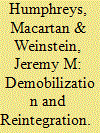

|
|
|
|
|
| Publication |
2007.
|
| Summary/Abstract |
Since 1989, international efforts to end protracted conflicts have included sustained investments in the disarmament, demobilization, and reintegration (DDR) of combatants. Yet while policy analysts have debated the factors that contribute to successful DDR programs and scholars have reasoned about the macro conditions that facilitate successful peace building, little is known about the factors that account for successful reintegration at the micro level. Using a new dataset of ex-combatants in Sierra Leone, this article analyzes the individual-level determinants of demobilization and reintegration. Past participation in an abusive military faction is the strongest predictor of difficulty in achieving social reintegration. On economic and political reintegration, we find that wealthier and more educated combatants face greater difficulties. Ideologues, men, and younger fighters are the most likely to retain strong ties to their factions. Most important, we find little evidence at the micro level that internationally funded programs facilitate demobilization and reintegration
|
|
|
|
|
|
|
|
|
|
|
|
|
|
|
|
| 10 |
ID:
174761
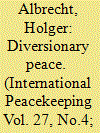

|
|
|
|
|
| Summary/Abstract |
What is the impact of international peacekeeping missions for civil-military relations at home? This article unpacks the conditions that produce positive effects of peacekeeping participation on the domestic politics of an authoritarian regime. Drawing on field research, I discuss four mechanisms that link foreign policy making to domestic civil-military relations in Ben Ali’s Tunisia. First, the deployment of troops for peacekeeping abroad presents obstacles for the coordination of coup plots at home. Second, incumbents can allocate material resources to meet officers’ economic grievances. Moreover, peacekeeping operations serve to enhance corporate institutionalization through specific training programmes. Finally, peacekeeping contributes to a professional ethos and hence the depoliticization of the officer corps. These findings give rise to the notion that contributing to peace can have similar effects for domestic politics as going to war.
|
|
|
|
|
|
|
|
|
|
|
|
|
|
|
|
| 11 |
ID:
139196
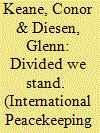

|
|
|
|
|
| Summary/Abstract |
Afghanistan was the first major test for US nation-building efforts in the twenty-first century. Previous analyses have identified many of the barriers that prevented the USA from engaging in effective infrastructure development, governance, security, counter-insurgency and counter-narcotics. Drawing upon interviews with senior US officials, this article offers an alternative account of the nation-building experience that highlights problems within the US government. Building on the assertions of Graham Allison, it focuses on the behaviour of the agencies and individuals within the US bureaucracy. It is argued that a lack of effective leadership permitted bureaucratic disorder between and within the military establishment, the State Department and the United States Agency for International Development (USAID). The conflict that was precipitated by this dissonance prevented the emergence of a cohesive nation-building strategy.
|
|
|
|
|
|
|
|
|
|
|
|
|
|
|
|
| 12 |
ID:
169071
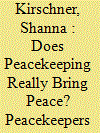

|
|
|
|
|
| Summary/Abstract |
Peacekeeping mitigates killing, but nonlethal violence also influences both positive peace and stability. We evaluate peacekeepers’ effect on one such type of abuse, sexual violence. We posit that peacekeepers raise the cost of abuses and foster institutional and cultural changes that curb violence. We find that missions both reduce the chance of any violence and limit its prevalence; larger deployments and multidimensional missions are more effective. Governments curtail violence more quickly than rebels do in response to military contingents; rebels are especially responsive when missions include large civilian components. These findings contribute to our understanding of peacekeeping in three primary ways: we expand the evaluation of peacekeeping to consider nonlethal violence; we draw attention to mission size, capacity to use force, and civilian-led programming as determinants of effectiveness; and we demonstrate how addressing nonlethal violence requires similar tools as lethal violence but is further enhanced by specific civilian-led initiatives.
|
|
|
|
|
|
|
|
|
|
|
|
|
|
|
|
| 13 |
ID:
131319
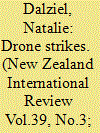

|
|
|
|
|
| Publication |
2014.
|
| Summary/Abstract |
As New Zealand's role in Afghanistan comes to a close, the War on Terror has been relegated to the backseat of the New Zealand public's consciousness, albeit prematurely so. With the first New Zealander killed in a drone strike in Yemen, it is timely that New Zealand reconsider its support for a tactic that opponents argue is itself an act of terrorism. As yet no consensus has been reached as to whether drone strikes constitute a breach of international law. We must, therefore, base our assessment on whether the tactic is ethically and strategically flawed. With every hell-fire missile that Nobel Peace Prize winning Barack Obama rains down on al-Qaeda and any civilians unfortunate enough to be in the way, a New Zealand decision on this question becomes more urgent.
|
|
|
|
|
|
|
|
|
|
|
|
|
|
|
|
| 14 |
ID:
023014
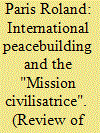

|
|
|
|
|
| Publication |
Oct 2002.
|
| Description |
635-656
|
|
|
|
|
|
|
|
|
|
|
|
|
|
|
|
| 15 |
ID:
061169
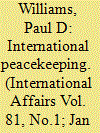

|
|
|
| 16 |
ID:
156535
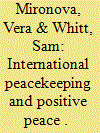

|
|
|
|
|
| Summary/Abstract |
To what extent can international peacekeeping promote micro-foundations for positive peace after violence? Drawing on macro-level peacekeeping theory, our approach uses novel experimental methods to illustrate how monitoring and enforcement by a neutral third party could conceivably enhance prosocial behavior between rival groups in a tense, postconflict peacekeeping environment. Using a laboratory experiment in postwar Kosovo, we find that third-party enforcement is more effective at promoting norms of trust between ethnic Serbs and Albanians than monitoring alone or no intervention at all. We then consider real-world extensions for building positive peace across different intervention environments. Using a dictator experiment that exploits heterogeneity in NATO peacekeeping in different regions of Kosovo, our inferences about monitoring and enforcement appear robust to ecological conditions in the field.
|
|
|
|
|
|
|
|
|
|
|
|
|
|
|
|
| 17 |
ID:
124439
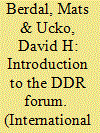

|
|
|
|
|
| Publication |
2013.
|
| Summary/Abstract |
Over the past two decades, international efforts to support the socio-economic adjustment of ex-combatants to the uncertain and often messy realities of postwar situations, have presented donor countries, NGOs and international organizations with complex, often formidable, institutional and logistical challenges. Many of these have been exhaustively and often expertly covered in the still burgeoning literature on disarmament, demobilization and reintegration (DDR). While they continue to merit scholarly and policy attention, the underlying focus of this special issue of International Peacekeeping is less on what we in the past have referred to as the mechanics of DDR - that is, how best to plan, organize, coordinate and fund DDR activities - than on the context and politics of reintegrating ex-combatants following protracted periods of armed conflict and civil war.
|
|
|
|
|
|
|
|
|
|
|
|
|
|
|
|
| 18 |
ID:
052307
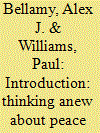

|
|
|
| 19 |
ID:
132300
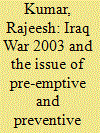

|
|
|
|
|
| Publication |
2014.
|
| Summary/Abstract |
The adoption of pre-emptive self-defence as a policy by the United States of America in its war against terrorism has revived the controversy over the concept of pre-emptive use of force in international politics. Some scholars argue that states are stretching the right of self-defence as pre-emptive, preventive and anticipatory in accordance with their needs and interests and to justify their actions. For others, in the context of changing security threats such as terrorism and Weapons of Mass Destruction pre-emptive strikes are permissible. These efforts to redefine and re-interpret the right of self-defence and use of force for justifying state's actions have challenged the role of international organisations that were principally designed to regulate the unilateral use of force, and to maintain international peace and security. Against this backdrop, this article will examine how the pre-emptive and preventive use of force undermines the role of the United Nations in international politics through probing the case of Iraq War 2003. This would be a much needed reflection on the implications of Iraq War on multilateralism in the context of 10 years after the war.
|
|
|
|
|
|
|
|
|
|
|
|
|
|
|
|
| 20 |
ID:
130503
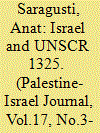

|
|
|
|
|
| Publication |
2011.
|
| Summary/Abstract |
On the night between May 30 and 31, 2010, Israeli commandos attacked the Mavi Marmara, a Turkish ship that was part of a flotilla making its way toward Gaza to break the naval blockade. Nine people died on the ship during the military takeover, which led to international outrage as Israel became a target for political attacks and condemnations from all over the world and from within as well. On the night between May 30 and 31, 2010, Israeli commandos attacked the Mavi Marmara, a Turkish ship that was part of a flotilla making its way toward Gaza to break the naval blockade. Nine people died on the ship during the military takeover, which led to international outrage as Israel became a target for political attacks and condemnations from all over the world and from within as well. This law was passed five years ago, following a long process led by feminist organizations and several members of the Israeli parliament, and was a direct consequence of United Nations Security Council Resolution 1325, which was passed in October 2000. The fact that the Israeli law required representation from diverse groups of women was even a unique improvement on the original formulation of the UN resolution.
|
|
|
|
|
|
|
|
|
|
|
|
|
|
|
|
|
|
|
|
|